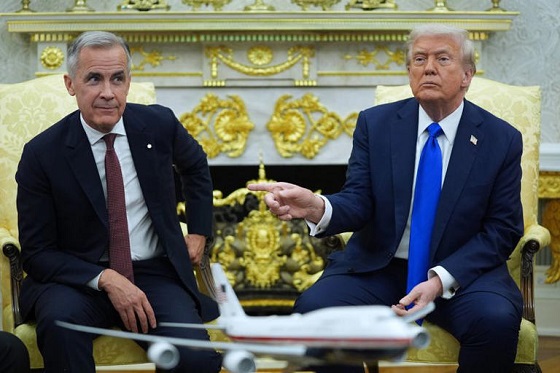Business
Flight attendants’ win proves the right to strike matters

This article supplied by Troy Media.
 By Peggy Nash
By Peggy Nash
Ottawa’s interference in the Air Canada strike delayed a resolution. When it stepped aside, a deal quickly followed
When governments get out of the way, collective bargaining works—and the Air Canada flight attendants proved it by reaching a deal the moment
they were left to negotiate freely.
The strike by 10,000 flight attendants ended on Aug. 19 with a tentative agreement between their union, the Canadian Union of Public Employees (CUPE), and the airline.
That only happened after the Canadian Industrial Relations Board, acting under the federal government, tried to force an end to the strike by ordering the employees back to work. The CIRB can suspend or limit strikes if it believes a labour dispute threatens public safety or the economy. In this case, it attempted to use that power to override the strike—a move workers strongly opposed.
Because Air Canada is federally regulated, labour disputes fall under federal labour law, not provincial. That gives Ottawa broader powers to intervene in disputes, including through back-to-work legislation or binding arbitration.
That legal context helps explain what happened next. The government’s attempted intervention failed. But when it stepped back and let both parties negotiate freely, a deal was reached within hours.
It was a swift and fair outcome—one that likely could have happened earlier if not for the looming threat of government interference.
Employers already hold most of the power. They decide when to invest, where to expand and who to hire or fire. They often benefit from institutional credibility and public sympathy. The only meaningful power workers have is the ability to bargain collectively, and, if necessary, to strike.
The Air Canada flight attendants—more than 70 per cent of whom are women— hadn’t been able to negotiate a proper contract in over a decade. Wages had fallen behind inflation, even as they were expected to live in some of the country’s most expensive cities. Many had less than five years’ seniority and were paid near-poverty wages. They also performed unpaid ground work before and after flights.
Their frustration translated into action. They were fighting for better pay and to be compensated for all the hours they worked. And they were united. Over 90 per cent of union members voted. Of those, 99.7 per cent backed the strike. The public supported them too.
Air Canada, however, appeared to be counting on the government to intervene—expecting Ottawa to force arbitration and deny workers a vote on their own contract.
That undermines the constitutional right to free collective bargaining and feeds growing frustration among workers as corporate profits soar while wages stagnate. Last year, Air Canada’s CEO earned $12 million while some staff struggled to make ends meet.
This kind of imbalance shows why collective bargaining rights matter. The system is meant to balance power—ensuring workers can negotiate fairly while employers continue to operate between contracts. That structure has mostly preserved labour peace in Canada.
But when government overrides that process, it invites disorder. In this case, it led to hundreds of thousands of delays for passengers, lost revenue and reputational damage, only for both sides to agree on terms they might have reached much earlier if the threat of interference hadn’t been on the table.
The outcome sets an important precedent. If major employers expect Ottawa to intervene every time a union takes job action, the right to strike becomes meaningless. And that weakens the bargaining power of workers across the country—not just in aviation.
CUPE flight attendants—and their union—deserve credit for standing up for their rights. In doing so, they rallied support across the labour movement.
The lesson is simple: when governments and corporations overreach, they risk losing control. But when workers stand together and fight for fairness, they can win.
Peggy Nash is the executive director of the Canadian Centre for Policy Alternatives.
Troy Media empowers Canadian community news outlets by providing independent, insightful analysis and commentary. Our mission is to support local media in helping Canadians stay informed and engaged by delivering reliable content that strengthens community connections and deepens understanding across the country.
Business
Government distorts financial picture with definition of capital

“The government is acting fast and loose with the definition of ‘capital. Handing out corporate welfare shouldn’t be considered ‘capital.’
The Canadian Taxpayers Federation is calling on Prime Minister Mark Carney to focus on reducing debt rather than distorting the financial picture by watering down the definition of “capital” spending, as noted by the Parliamentary Budget Officer.
“The PBO shows the government is inappropriately expanding the definition of ‘capital’ spending,” said Franco Terrazzano, CTF Federal Director. “The reality is taxpayers need to cut through Carney’s budget spin and look at one number: How fast is the debt is going up?”
The Carney government announced it’s separating operating and capital spending in its budget. It also released its criteria for what it would consider capital spending.
The PBO’s analysis found that “Finance Canada’s definition and categories expand the scope of capital investment beyond the current treatment of capital spending in the Public Accounts of Canada.”
The PBO added that “based on our initial assessment, we find that the scope is overly expansive and exceeds international practice such as that adopted by the United Kingdom.”
“The government is acting fast and loose with the definition of ‘capital,’” Terrazzano said. “Handing out corporate welfare shouldn’t be considered ‘capital.’
“Regardless of the spending category, more debt means more interest payments and that’s what taxpayers need to focus on to hold the government accountable.”
The PBO’s Economic and Fiscal Outlook projects this year’s “deficit to increase sharply to $68.5 billion.” Debt interest charges will cost taxpayers $55.3 billion this year. That means that paying interest on the federal debt will cost each Canadian about $1,300 this year.
“The government is trying to muddy the water with its accounting nonsense,” Terrazzano said. “The government should stop focusing on cutting the numbers and instead focus on cutting the debt.
“Taxpayers will need to cut through all the accounting noise from the government and focus on one question: Is the debt going up or down?”
Business
Canada Post is failing Canadians—time to privatize it

From the Fraser Institute
By Jake Fuss and Alex Whalen
In the latest chapter of a seemingly never-ending saga, Canada Post workers are on strike again for the second time in less than a year, after the federal government allowed the Crown corporation to close some rural offices and end door-to-door deliveries. These postal strikes are highly disruptive given Canada Post’s near monopoly on letter mail across the country. It’s well past time to privatize the organization.
From 2018 to the mid-point of 2025, Canada Post has lost more than $5.0 billion, and it ran a shortfall of $407 million in the latest quarter alone. Earlier this year, the federal government loaned Canada Post $1.034 billion—a substantial sum of taxpayer money—to help keep the organization afloat.
As a Crown corporation, Canada Post operates at the behest of the federal government and faces little competition in the postal market. Canadians have nowhere to turn if they’re unhappy with service quality, prices or delivery times, particularly when it comes to “snail mail.”
Consequently, given its near-monopoly over the postal market, Canada Post has few incentives to keep costs down or become profitable because the government (i.e. taxpayers) is there to bail it out. The lack of competition also means Canada Post lacks incentives to innovate and improve service quality for customers, and the near-monopoly prohibits other potential service providers from entering the letter-delivery market including in remote areas. It’s clearly a failing business that’s unresponsive to customer needs, lacks creativity and continuously fails to generate profit.
But there’s good news. Companies such as Amazon, UPS, FedEx and others deliver more than two-thirds of parcels in the country. They compete for individuals and businesses on price, service quality and delivery time. There’s simply no justification for allowing Canada Post to monopolize any segment of the market. The government should privatize Canada Post and end its near-monopoly status on letter mail.
What would happen if Ottawa privatized Canada Post?
Well, peer countries including the Netherlands, Austria and Germany privatized their postal services two decades ago. Prices for consumers (adjusted for inflation) fell by 11 per cent in Austria, 15 per cent in the Netherlands and 17 per cent in Germany.
Denmark has taken it a step further and plans to end letter deliveries altogether. The country has seen a steep 90 per cent drop in letter volumes since 2000 due to the rise of global e-commerce and online shopping. In other words, the Danes are adapting to the times rather than continuing to operate an archaic business model.
In light of the latest attempt by the Canadian Union of Postal Workers to shakedown Canadian taxpayers, it’s become crystal clear that Canada Post should leave the stone age and step into the twenty-first century. A privately owned and operated Canada Post could follow in the footsteps of its European counterparts. But the status quo will only lead to further financial ruin, and Canadians will be stuck with the bill.
-

 COVID-192 days ago
COVID-192 days agoFreedom Convoy Sentencing: Lich and Barber escape prison terms but will spend months in house arrest
-

 COVID-1923 hours ago
COVID-1923 hours agoDevastating COVID-19 Vaccine Side Effect Confirmed by New Data: Study
-

 Alberta1 day ago
Alberta1 day ago‘Visionary’ Yellowhead Pipeline poised to launch Alberta into the future
-

 Crime2 days ago
Crime2 days agoCanadian Sovereignty at Stake: Stunning Testimony at Security Hearing in Ottawa from Sam Cooper
-

 COVID-192 days ago
COVID-192 days agoChris Barber will not see prison time for his role in peaceful Freedom Convoy
-

 Crime2 days ago
Crime2 days agoThe Bureau Exclusive: Chinese–Mexican Syndicate Shipping Methods Exposed — Vancouver as a Global Meth Hub
-

 Alberta1 day ago
Alberta1 day agoSheriffs shut down Olds drug house
-

 Business1 day ago
Business1 day agoTrump and Carney full of warm compliments but still no trade deal between Canada and U.S.









